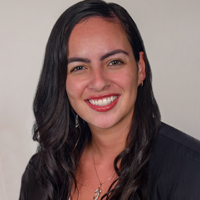Reflections: What I Learned as a Student in the Immigration Clinic by Melanie Dostis '21
 Melanie Dostis is currently a third-year law student at William & Mary. In addition to her work with the Immigration Clinic, she has interned with the Georgia Asylum and Immigration Network and currently clerks for the immigration law firm, Fragomen, Del Rey, Bernsen & Loewy. She is the Executive Editor of the William & Mary Journal of Race, Gender and Social Justice, President of the Latinx Law Student Association and a member of the Moot Court team. She is a cum laude graduate of Northeastern University and a former journalist.
Melanie Dostis is currently a third-year law student at William & Mary. In addition to her work with the Immigration Clinic, she has interned with the Georgia Asylum and Immigration Network and currently clerks for the immigration law firm, Fragomen, Del Rey, Bernsen & Loewy. She is the Executive Editor of the William & Mary Journal of Race, Gender and Social Justice, President of the Latinx Law Student Association and a member of the Moot Court team. She is a cum laude graduate of Northeastern University and a former journalist.
I’ve had the privilege of working with the Immigration Clinic since summer 2020—first as a research assistant, then as a student during the fall semester and now assisting with translation work during my last semester.
Throughout this time, I’ve spoken with dozens of clients as they navigate the complex and ever-changing realm of immigration law. I’ve learned that essentially every letter of the alphabet stands for a different kind of visa, each carrying a host of requirements, deadlines, and payments. I’ve drafted countless immigration applications condensing the most painful details of an applicant’s life into a few pages. I’ve been trusted with life stories that I’ll never forget. More than all this, my time with the Immigration Clinic has brought me endless gratitude and blessings from the clients I’ve met.
In particular, one of my clients from the Clinic always ended our calls, no matter how brief, by wishing me “muchas, muchas bendiciones,” meaning “many, many blessings to you.” When I was first assigned her case, her case was meant to be a less-active case for me during my Clinic time; she had submitted her immigration claim for a U Visa petition years earlier with another organization, and a previous Clinic student had done an incredible job helping her submit additional required evidence to Homeland Security. She was eligible for the U Visa because she had spoken out and helped police prosecute and deport her partner for domestic violence. As she waited to see if the critical assistance she provided to law enforcement would allow her to receive a U Visa, it didn’t seem there was much for me to do but continually monitor her case status and check in with her. However, immigration work, as I’ve learned, is never that simple…
One night, I received a panicked call from her, pleading for our help to file a work permit, which she could now secure due to her placement on a waitlist for a U Visa. Following up on the work of former Clinic students Michael Jordan and Kelsie Sicinski, I spent days researching how the changing laws of immigration and increased fees might affect her work permit. Prof. Kern-Scheerer and Nicole Alanko helped me plot out strategies to make sure any work permit application submitted now would not cause any issues for her down the road. I gathered numerous required documents, translating them to English where necessary and prepared to send her application.
Then, on one of the final days of 2020, we learned her U Visa was granted. Our client was finally on a path to legal status and would receive a work permit. Some of the work I completed was no longer necessary to submit to Homeland Security, but I learned so much from the process. I gained confidence in communicating with an anxious client. I became more skilled at thinking through a case from various angles, making sure I was analyzing the future of the case the way an immigration official might approach her file one day. The work reminded me that, especially in immigration, things won’t always go according to the plan I carefully crafted and prepared—and that’s ok. I feel equipped in those moments now because the Clinic has taught me how to adjust and adapt my work as necessary. Moreover, I know the work I did gave this client a sliver of comfort as she continued to desperately wait for news and look over her shoulders every day.
This story, unlike others in immigration, had a happy ending. Working in the Immigration Clinic is not easy work. It means working in a field marked by constant changes and rejections and hearing stories of trauma. It also means working alongside motivated legal thinkers undeterred by how high the odds may be and meeting resilient people who enrich our society. Especially as the pandemic continues, I feel incredibly fortunate to offer legal services to one of our most vulnerable communities.
To learn more about the Immigration Clinic, visit its web page and blog.
About William & Mary Law School
Legal education in a university setting began at William & Mary in 1779. Now in its third century, America's first law school continues its historic mission of educating citizen lawyers who are prepared both to lead and to serve.


